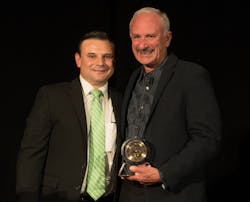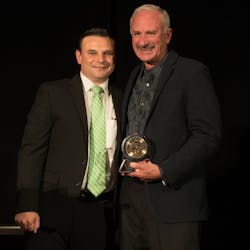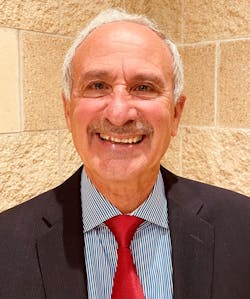By Karen Hanna
Maac Machinery’s James Alongi owes not one job, but two, to his family ties.
The first gig came by way of a legendary Chicago Bears running back known as “Sweetness” — Walter Payton, who followed up his hall of fame career with a series of entrepreneurial pursuits.
Alongi landed a job as a CFO for one of the businesses.
“Toward the end of the interview, he asked me, ‘Do you have a photo of your family?’ And it just so happened, I had a photo of my family in my wallet,” Alongi recalled. “And that was the difference between being hired and not hired.”
Payton wanted to know one thing of his prospective employee: “Is this a family guy or not?”
He need not have worried about Alongi, who’s now one of eight Alongis at Maac, the thermoformer manufacturer that his brother, Paul, established in 1982. The newest recipient of theLifetime Achievement Award from the Thermoforming Division of the Society of Plastics Engineers, James Alongi spoke recently withPlastics Machinery & Manufacturing senior staff reporter Karen Hanna.You worked at other jobs before becoming president at Maac in 1997. What brought you to the company?
Alongi: My brother made me an offer I couldn’t refuse. I’m a CPA; I’ve always made it up into the chief financial officer position for a couple of different companies. And Paul was looking for someone to not only handle the chief financial officer duties, but also some of the operational duties, so that interested me. I’ve always had a great working relationship with my brother; we’ve always been best friends. Even when he started the business, I remember on the kitchen table, helping do a little cash-flow spreadsheet for him before he started.
Before that, I was in transportation industries, and then before that I was in chemical manufacturing.
How big a company was it at that time? How much has it grown?
Alongi: It was in the range of $4 million, and now we’re in the $20-million range.
Is your role in the business still on the financial side?
Alongi: Up until three years ago, I handled all the financial responsibilities, as well as being in charge of engineering and manufacturing services. Two or three years ago, my nephew joined on board, and he’s taken over the financial responsibilities, so now I’m focused just on the operational side.
How many family members are part of the business?
Alongi: Well, Paul has four sons, and I have three sons, but two of them are here. So, there’s eight of us, three sets of brothers.
We’re very lucky. Very lucky.
What are some of the biggest innovations you’ve seen over time at Maac?
Alongi: In the past, we’ve seen a lot more seasonality in equipment sales. You’d have up years and down years. The last eight years or so, we really haven’t seen the valleys; it’s been steadily growing, other than the COVID year. It’s been an interesting trend because before, you had to be very quick to be able to make decisions to change staffing levels and all of that in order to adjust for peak sales and then lower sales.
What accounts for your company’s success?
Alongi: We’ve been run by the same ownership for 30-some years. If there’s any problems or things like that, we always stand behind our products, take care of things. We have a very good service department. And our sales guys are probably the best out there, and they’ve been with us for 20 years.
What's Maac’s niche, in terms of selling equipment?
Alongi: Our kinds of applications are anything that's large plastic, so appliances, your refrigerators. That deep-draw plastic, that’s done on our type of machines. You see a lot of bathtubs and showers and those kinds of things, where it’s a large piece of plastic that they form.
We have four different basic lines of machines. Where we’ve always thought we excelled was in the rotary machine. It’s a higher-volume, three-station or four-station machine that continually produces a part on every cycle, and it works very well with any of the heavy, thick plastics.
One of our biggest customers is WeatherTech, with the [automotive] floor liners that they make. WeatherTech Founder David MacNeil has done such a fantastic job with that business.
Many companies have had trouble attracting and retaining employees. What is Maac’s secret for keeping staffers for 20 years?
Alongi: We have a great core group of employees that probably are in the vicinity of 15 to 25 years with us, and we continue to grow. We generally are shipping one machine a week.
It’s a nice place to work. People enjoy working here.
Tell me about your work with the Thermoforming Division.
Alongi: I joined Maac in 1997, and I joined SPE at the same time. I thought it was important to support the industry that supports me and my family, so I ended up joining the board of directors for the Thermoforming Division in ’99, and I’ve been with them ever since. I was on the machinery committee and the finance committee, and because of my CPA background, I’ve been on the finance committee ever since.
I was treasurer of the division for about eight years, from 2010 to 2017 or so.
And I’ve been active with the scholarship program, since 2001. Almost every year, we’ve had two or three recipients.
The other thing I’ve been active with has been grants for machinery. We have a program where we donate $10,000, the SPE division will donate $10,000, and the school would have to pay, in the beginning, $10,000 — it used to be $30,000 for a lab machine. We’ve sponsored, I believe, 26 machines, starting in about 2000 for schools and universities throughout the U.S.
It’s not always a Maac machine; there could be something else that might be like a tabletop-type machine.
What else are you doing to introduce young people to the plastics industry?
Alongi: We’re always looking for ways to improve education, there’s no doubt about it. It’s very difficult, especially in our industry, because when anyone goes through one of the plastics programs, it’s usually focused on injection molding. Certain schools do have some programs that expose us in their plastics program.
What the Thermoforming Division has been doing in order to try and get students a little bit involved is we have the Student RC Car competition. They have to design the body, form it in plastic, and then they get to come to the conference and race their car. We sponsor one school with a car. As long as the professors promote this and have it in their curriculum, it works out pretty well. It makes it a lot of fun for the kids, as well. There was a good number of them here at our last conference, and they had a chance to walk around all the booths and introduce themselves and hand out resumes.
You’ve also helped with the parts competition. How did you get involved with that?
Alongi: The first time I was drafted to do the parts competition was in 2001. Our conference was a week after Sept. 11, and the person who was supposed to handle the parts competition just could not get a flight; there were no flights. So that was the first year I did the parts competition. I did it for about four years in a row, before it was transferred to other people, but I still usually try to help out if I can.
How have the parts and applications evolved since you started working on the competition?
Alongi: That’s one of the nice things about going to any of the conferences that we have is just seeing the parts competition, and to look and try and understand how they came out with that part. It’s fun to see.
There’s no doubt that the parts are progressing each year. More detail, more undercuts. But we’ve had pressure forming for the last 25 years. Most of the improvements have been in the controls and in the motion controls for the last 20-some years. Most recently, it’s really been the software and the statistics and reporting that’s seen a significant jump.
How much longer do you see yourself working?
Alongi: My own internal clock was probably around 70 [years old], looking to significantly reduce hours. That’s something we’ve been building up to do. I don’t have any plan at this point, other than I’m going to stay active.
What do you enjoy doing outside of work?
Alongi: All of my children live within 20 minutes away from me. I’ve got seven grandchildren. My oldest is 11, and my youngest is going to turn 1 [in November], so I’m very active with my grandchildren and children on the weekends, especially when the weather’s nice. Everybody enjoys getting together. We’re very lucky, especially in today’s day and age where it seems like everyone’s moving far across the country.
Can we expect to see any of your grandchildren, or your brother Paul’s grandchildren, at Maac in the years to come?
Alongi: Most are not in the workforce yet, but I am sure that if they are interested, they will be provided an opportunity to excel. It will be up to them to decide if they share the same passion that we have.
How would you like to be remembered?
Alongi: Just, you know, someone who led by example, hard work and enjoying family.
WHO IS HE: James Alongi
AGE: 68
TITLE: President, Maac Machinery Co. Inc.
HEADQUARTERS: Carol Stream, Ill.
NUMBER OF EMPLOYEES: About 100
About the Author
Karen Hanna
Senior Staff Reporter
Senior Staff Reporter Karen Hanna covers injection molding, molds and tooling, processors, workforce and other topics, and writes features including In Other Words and Problem Solved for Plastics Machinery & Manufacturing, Plastics Recycling and The Journal of Blow Molding. She has more than 15 years of experience in daily and magazine journalism.


